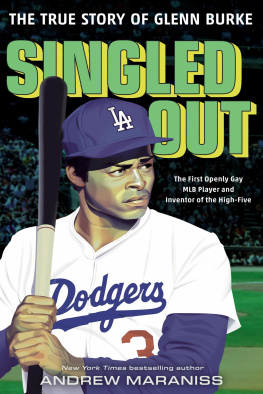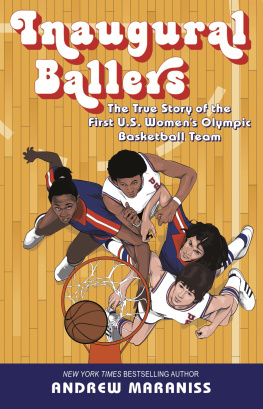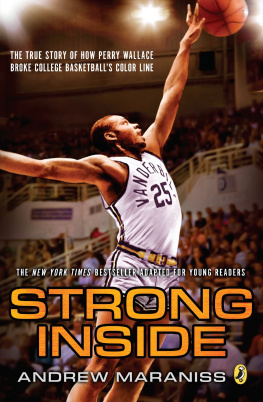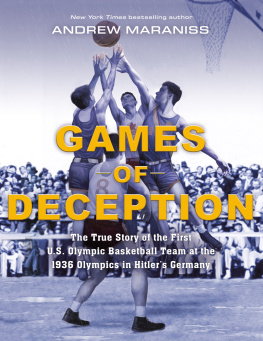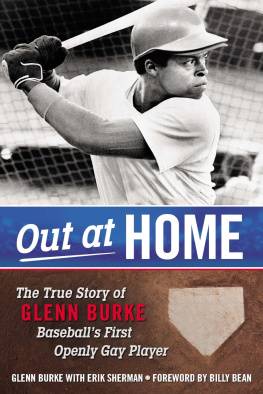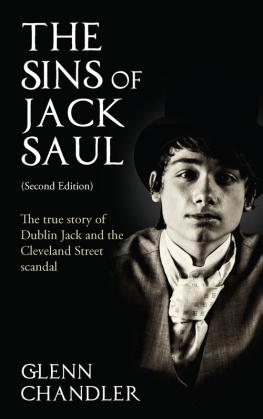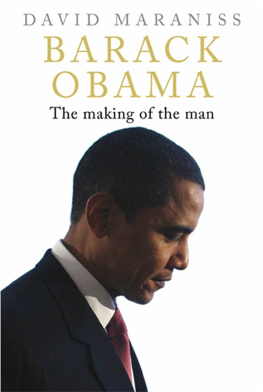Andrew Maraniss - Singled out : the true story of Glenn Burke
Here you can read online Andrew Maraniss - Singled out : the true story of Glenn Burke full text of the book (entire story) in english for free. Download pdf and epub, get meaning, cover and reviews about this ebook. year: 2021, genre: Non-fiction. Description of the work, (preface) as well as reviews are available. Best literature library LitArk.com created for fans of good reading and offers a wide selection of genres:
Romance novel
Science fiction
Adventure
Detective
Science
History
Home and family
Prose
Art
Politics
Computer
Non-fiction
Religion
Business
Children
Humor
Choose a favorite category and find really read worthwhile books. Enjoy immersion in the world of imagination, feel the emotions of the characters or learn something new for yourself, make an fascinating discovery.
- Book:Singled out : the true story of Glenn Burke
- Author:
- Genre:
- Year:2021
- Rating:5 / 5
- Favourites:Add to favourites
- Your mark:
- 100
- 1
- 2
- 3
- 4
- 5
Singled out : the true story of Glenn Burke: summary, description and annotation
We offer to read an annotation, description, summary or preface (depends on what the author of the book "Singled out : the true story of Glenn Burke" wrote himself). If you haven't found the necessary information about the book — write in the comments, we will try to find it.
Singled out : the true story of Glenn Burke — read online for free the complete book (whole text) full work
Below is the text of the book, divided by pages. System saving the place of the last page read, allows you to conveniently read the book "Singled out : the true story of Glenn Burke" online for free, without having to search again every time where you left off. Put a bookmark, and you can go to the page where you finished reading at any time.
Font size:
Interval:
Bookmark:
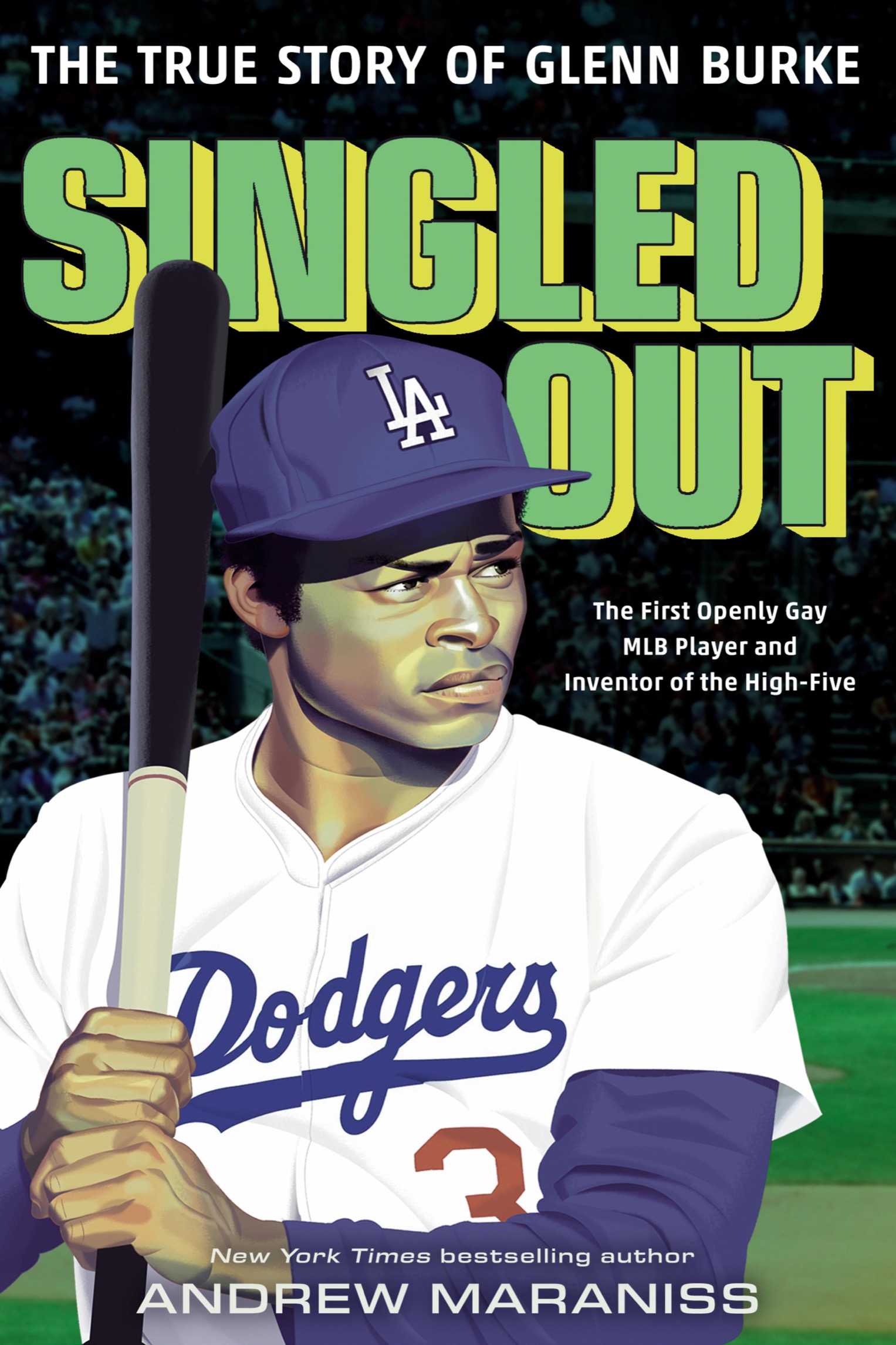
Strong Inside
Games of Deception

PHILOMEL BOOKS
An imprint of Penguin Random House LLC, New York

First published in the United States of America by Philomel,
an imprint of Penguin Random House LLC, 2021
Copyright 2021 by Andrew Maraniss
Penguin supports copyright. Copyright fuels creativity, encourages diverse voices, promotes free speech, and creates a vibrant culture. Thank you for buying an authorized edition of this book and for complying with copyright laws by not reproducing, scanning, or distributing any part of it in any form without permission. You are supporting writers and allowing Penguin to continue to publish books for every reader.
Philomel Books is a registered trademark of Penguin Random House LLC.
Visit us online at penguinrandomhouse.com.
Library of Congress Cataloging-in-Publication Data is available.
Ebook ISBN 9780593116739
Edited by Kelsey Murphy
Cover art 2021 by Nigel Buchanan
Cover design by Maria Fazio
pid_prh_5.6.1_c0_r0
With love and high fives for Alison, Eliza, and Charlie
:
Bobby Haskell had learned not to be surprised by anything he encountered on the blustery streets and alleys of San Franciscos Tenderloin district.
In the early 1990s it was his job to scour these places, looking for the people most of society preferred to ignore, the drug addicts, sex workers, and runaways, the sick and the dying. As a therapist and homeless advocate for the Tom Waddell Clinic, Haskells mission was to find these men and women, to earn their trust, and to educate them on the health care services available to them through the clinic, to offer a human connection in a world in which they felt all alone.
Haskell has never forgotten the day he walked into one of the many cheap hotels in the seedy Tenderloin in search of a homeless man his boss had asked him to track down. To call these places hotels was a stretch; they werent national chains that offered free breakfast, a pool, and cable TV. Instead they were the kinds of dingy hostels that locked the fire escapes to keep people from skipping out on their bills. A bar of soap was a luxury. But for the men and women who could scrape together enough money (typically less than $10 a night), a room here was a step up from living on the street, even if just for a month, a week, or a day.
Haskell found the room he was looking for and knocked on the door. Even by the dismal standards of the Tenderloin, this was the barest room hed ever seen. No furniture; just a mattress in the corner. And on that mattress was a Black man, curled up in the fetal position, wearing nothing but a pair of shorts. The man was sobbing and soaked in sweat, crying tears Haskell recognized from years on the streets: tears of hopelessness, fear, and drugs.
Haskell sat cross-legged on the floor, not preaching, not judging, only offering conversation and information about his clinics social and medical services. Gradually the man stopped crying. There was a spark in his eyes and the hint of a muscular, athletic body. In this godforsaken place, he still exuded charm and charisma.
The man on the mattress spoke with the ease of someone accustomed to meeting new people. He began to share the story of his life, telling tales of athletic feats on the playgrounds of Berkeley, California, of a professional baseball career that had carried him to the games highest peak, of the brief but joyful days of freedom and light when he was one of the most popular men in town.
Bobby Haskell had heard all kinds of bizarre stories from people on the streets. One man had insisted that the FBI had planted radios in his thumbs; another claimed to be a Vietnam veteran suffering from PTSD, though he was far too young to have served in that war.
But Haskell was savvy enough to know the difference between lies and schizophrenia and the strange but true.
So when the man sitting across from him said he had once played for the Los Angeles Dodgers, had started in center field in Game 1 of the 1977 World Series, and had even invented the high five, Bobby believed him.
The man on the mattress?
His name was Glenn Burke.
On October 11, 1977, Glenn Burke stood in the heart of the sports universe, patrolling center field at Yankee Stadium for the Los Angeles Dodgers in Game 1 of the World Series.
After spending six seasons working his way up through the Dodgers Minor League farm system, Burke had arrived in the Bronx prepared for this moment in the spotlight.
He was an uncommonly talented athlete, even among other big leaguers, with so much potential that Dodger first-base coach Jim Gilliam had compared him to one of the games all-time greats, Willie Mays. Dodger manager Tommy Lasorda had enough confidence in his rookie to write Burkes name in the starting lineup in the biggest game of either mans career. Teammates loved his enthusiasm and gap-toothed grin, the laughter he brought to the locker room, the funky music blasting from his boom box.
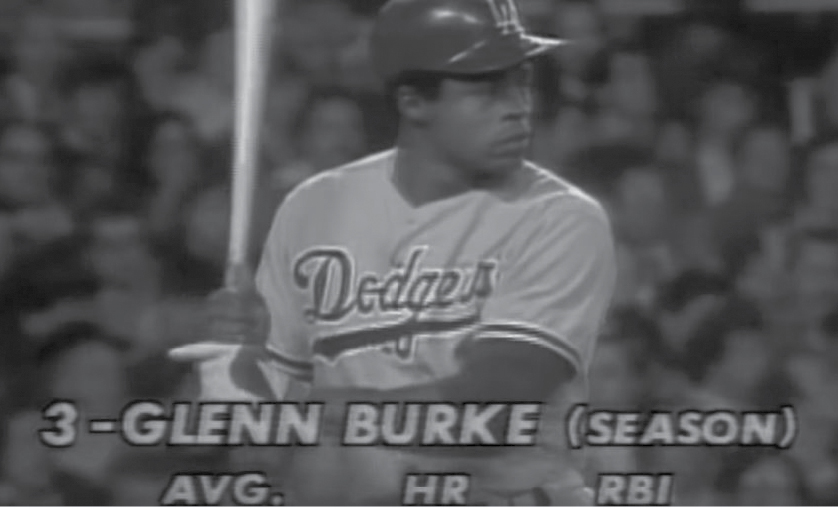
Glenn Burke started in center field for the Los Angeles Dodgers in Game 1 of the 1977 World Series. His sixth-inning single should have scored Steve Garvey, but home plate umpire Nestor Chylak missed the call, robbing Burke of a World Series RBI. (ABC Sports)
Burke cut an imposing figure in his gray-and-blue Dodger uniform. With his broad chest, muscular legs, and seventeen-inch biceps, other players marveled at his strength and physique. He had an energy and toughness to match, never backing away from a fight. And he needed that attitude in New York. When the visiting Dodgers arrived at Yankee Stadium for a workout the day before Game 1, raucous young Yankee fans were there to greet them, rocking the team bus and shouting slurs at the players. As Game 1 unfolded, fans targeted Dodger players with rolls of toilet paper, stink bombs, whiskey bottles, and hard rubber balls.
None of this flustered Burke. Not the big city, not the YankeeDodger rivalry, not the stakes of the game, not the projectiles flying out of the bleachers. He had said so the day before, when he granted a sportswriter a phone interview while relaxing in his room at the Dodgers luxurious New York hotel, the Waldorf Astoria.
I dont get nervous no more, he confessed. The pressure hasnt hit me yet. When everybody was grabbing and hugging and pouring champagne over my head [after the Dodgers beat the Philadelphia Phillies to advance to the World Series] I thought to myself how lucky I was to be in the big leagues... Everything is happening so fast. Its hard to analyze what Im going through, but I dont want the music to stop.
The reporter asked Burke for his thoughts on playing in Yankee Stadium, a venue that was not only famous, but one of the most difficult ballparks in which to play center field. The expanse of green grass between the foul poles was enormous, with the left-center-field fence standing 430 feet from home plate, dead center 417. Just beyond the wall were reminders of the Yankees dominant past, shrines to Hall of Famers including Babe Ruth and Lou Gehrig.
Font size:
Interval:
Bookmark:
Similar books «Singled out : the true story of Glenn Burke»
Look at similar books to Singled out : the true story of Glenn Burke. We have selected literature similar in name and meaning in the hope of providing readers with more options to find new, interesting, not yet read works.
Discussion, reviews of the book Singled out : the true story of Glenn Burke and just readers' own opinions. Leave your comments, write what you think about the work, its meaning or the main characters. Specify what exactly you liked and what you didn't like, and why you think so.

